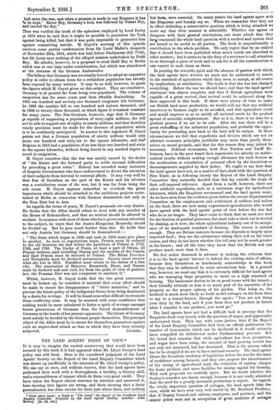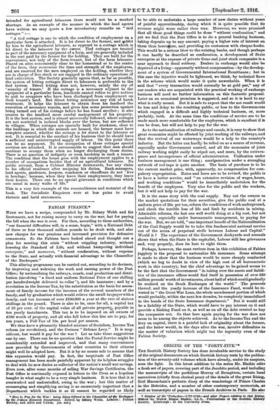THE LAND AGENTS' POINT OF VIEW.• IT is easy to
imagine the excited controversy that would have been aroused by this book if it had appeared when Mr. Lloyd George's land policy was still fresh. Here is the considered judgment of the Land Agents' Society on the Report of the Land Enquiry Committee which was drawn up unofficially in the interests of Mr. Lloyd George's policy. We can say at once, and without reserve, that the land agents have performed their work with a thoroughness, a lucidity, a literary skill, and a reasonableness of temper which do them very groat credit. They have taken the Report almost sentence by sentence and answered it, here showing that figures are wrong, and there showing that a hasty generalization has done service for facts just where facts, and nothing
• Pads about Land : a Reply to "The Land," the Report of the Unofficial Land Enquiry Committee. Prepared by the Lind Agents' Society. London : John Murray. 12s. Od. net.]
but fade, were essential. On many points the land agents agree with the Enquirers and frankly say so. When we remember that they are in effect defending a conservative position which is being attacked we must say that their manner is -admirable. Whether one agrees or disagrees with their general conclusions, one must admit that they hav examined the whole land question with a method and system that are bound to be useful to all parties. The book is unquestionably a contribution to the whole problem. We only regret that by an unkind fate it should have been published when men's minds are absorbed in other matters ; but it seems to be the duty of a reviewer to call attention to so thorough a piece of work and to ask for it all the consideration it can expect in such times as these.
In praising the scientific spirit and the absence of passion with which the land agents have written we must not be understood to assent to the standard of agriculture which they seem to accept, at all events by implication, as satisfactory. The truth is that the war has changed everything. Before the war we should have said that the land agents' statement was almost complete, and that if British agriculture were capable of a great revival, that revival could be achieved along the lines approved in this book. If there were plenty of time to make our British land more productive, we would still say that any artificial incentives to farmers ought to be avoided, and that agriculture could and would improve so as to satisfy all national needs by the gradual spread of scientific enlightenment. But as it is, there is no time for a gradual process if we are to be safe. After the war there will be a great reshuffling of the industrial population, and probably the oppor- tunity for persuading men back to the land will be unique. In these circumstances we feel that expedients and devices which are not on abstract economic principles justifiable may more than justify them- selves on moral grounds, and that for this reason they may indeed be necessary. Political economists, both Free Traders and Tariff Re- formers, have in the past based their arguments too strictly on mathe- matical results without making enough allowance for such factors as the acceleration or retardation of personal effort by the incentives or discouragements eupplied by their policy. We ought to say here that the land agents have not, as a matter of fact, dealt with the question of Free Trade, as in following closely the Report of the Land Enquiry Committee they naturally decided that this lay outside the scope of their self-imposed reference. Apart from a tariff, however, there are other artificial expedients, such as a minimum wage for agricultural labourers, which the Enquirers recommend and the land agents resist. As we have seen from the evidence given before the recent Departmental Committee on the employment and settlement of soldiers and sailors on the land, there are now many experienced agriculturists who would have agreed with the land agents' point of view before the war but who do so no longer. They have come to think that we must not wait for the fruition of gradual processes, but must take a short-cut to revival by shaking, as it were, the whole agricultural industry out of its accept- ance of an inadequate standard of farming. Tho reason is natural enough. They see Britain insecure because she depends so largely upon imported food ; they see tho submarines taking their toll on the trade routes, and they do not know whether this toll may not be much greater in the future ; and all the time they know that the ,British soil can produce much more than it does.
We feel rather disarmed in advance in making the criticism that it is to the land agents' interest to defend the existing state of affairs, because they themselves so handsomely acknowledge in this book that they may be influenced by some unconscious bias. In a general way, however, we must say that it is extremely difficult for land agents who are managing large properties to insist on a high standard of farming. The landowner desires to be on good terms with his tenants ; their friendly attitude to him is as much part of the amenities of his property as the proper upkeep of his garden. This being so, the landlord is much more likely to build model cottages on his farm than to say to a tenant-farmer, through the agent : " You aro not doing your duty by the land, and if your farm does not produce in future what I consider it can produce, you must go."
The land agents have not had a difficult task in proving that the Enquirers dealt very loosely with the question of wages, and appreciably understated thorn. They say, with some justice, that if the Report of the Land Enquiry Committee had been an official publication the number of inaccuracies which can be disclosed in it would certainly have compelled its withdrawal under Parliamentary pressure. But the broad fact remains that while agriculture has been prosperous, and wages have been rising, the amount of land growing cereals has not only not increased, but has decreased. That is the process which has to be stopped if we are to have national security. The land agents blame the Socialistic tendency of legislation before the war for the want of confidence among farmers, and they also propose the abandonment of the rating of agricultural land, the reduction of railway charges for home produce, and more facilities for raising capital for farming. With such proposals we cordially agree. But we doubt whether the Society's remedies are heroic enough, because it is not really admitted that the need for a greatly increased production is urgent. As regards the vitally important question of cottages, the land agents take the view, which we have seen very well stated by Mr. Rowland Prothero, that if County Council and railway employees, and postmen, and the county police were not in occupation of great numbers of cottages Intended for agricultural labourers there would not be a marked shortage. As an example of the manner in which the land agents have written we may quote a few introductory remarks on " tied
cottages " :-
" A tied cottage is one to which the condition of employment on a particular farm is attached. It is let direct to the farmer, and (giblet by him to the agricultural labourer, as opposed to a-cottage which is let direct to the labourer by the owner. Tied cottages are treated as part of the necessary equipment of a farm, and are generally included in the rent paid by the farmer for the holding. They are built for the convenience, not only of the farm-tenant, but of the farm labourer. Placed on sites conveniently close to the homestead or to the centre of the farm, they economize the time and strength of the employees, and are reserved for the men employed on the holding, whether they are in charge of live stock or are engaged in the ordinary operations of land cultivation. The Society generally agrees that, as far as possible, the system of lotting cottages direct to labourers is preferable to the tied system. Direct letting does not, however, satisfy the cry of `security of tenure.' If the cottage is a necessary adjunct to the equipment of a particular farm, landlords cannot refuse to give notices to quit to occupiers who have been discharged from employment on their tenant's land. But direct letting minimizes any risk of harsh treatment It helps the labourer to obtain from his landlord the execution of necessary repairs, and gives him some protection against being turned out of his cottage before he has found another ; it also secures to the landlord more careful management of his property. It is the best system, and is almost universally followed, where cottages aro not scattered in isolated blocks over the farms, but are collected in villages. When cottages are specially built for stockmen, close to the buildings in which the animals are housed, the farmer must have complete control, whether the cottage is let direct to the labourer or not It is essential to the conduct of his business that ho should have a sufficient and uninterrupted supply of labour. On this point there can be no argument. To the occupation of these cottages special services are attached. It is unreasonable to suggest that men should continue to occupy them when no longer discharging those duties. There is no question of indignity or even hardship in such a tenure. The condition that the house goes with the employment applies to a number of occupations besides that of an agricultural labourer. No public servant, from a Cabinet Minister downwards, has any claim to his official residence after resigning his duties. Bank-managers, land agents, gardeners, keepers, coachmen or chauffeurs do not live in bondage,' because, when they leave their employments, they leave their houses. There can be no special grievance in conditions which are usual in many walks of life.
This is a very fair example of the reasonableness and restraint of the book. The Socialistic Enquirers were at less pains to avoid rhetoric and lurid statements.































 Previous page
Previous page